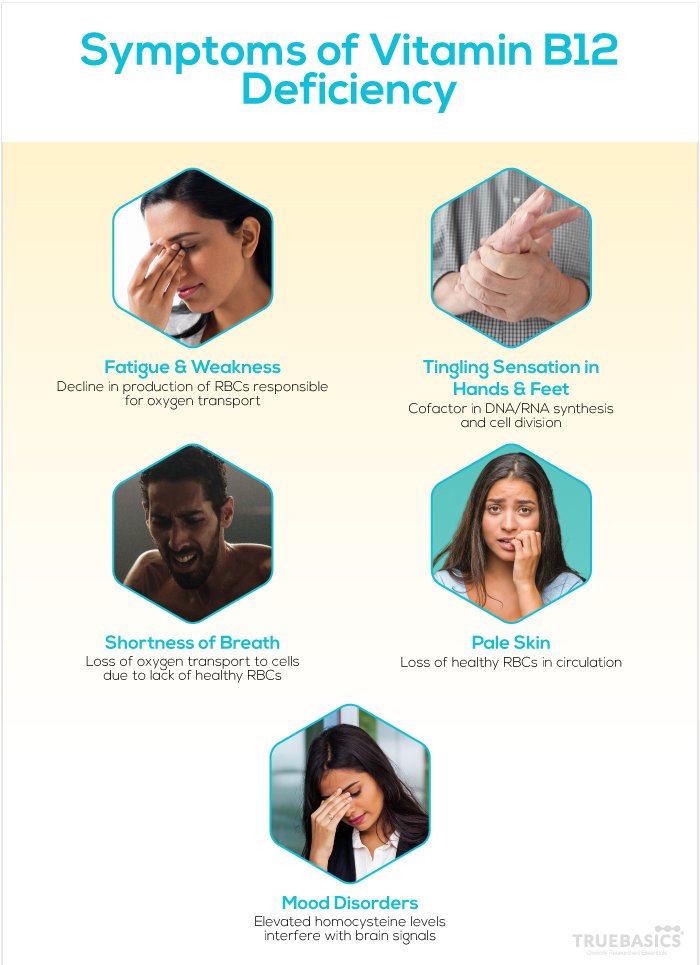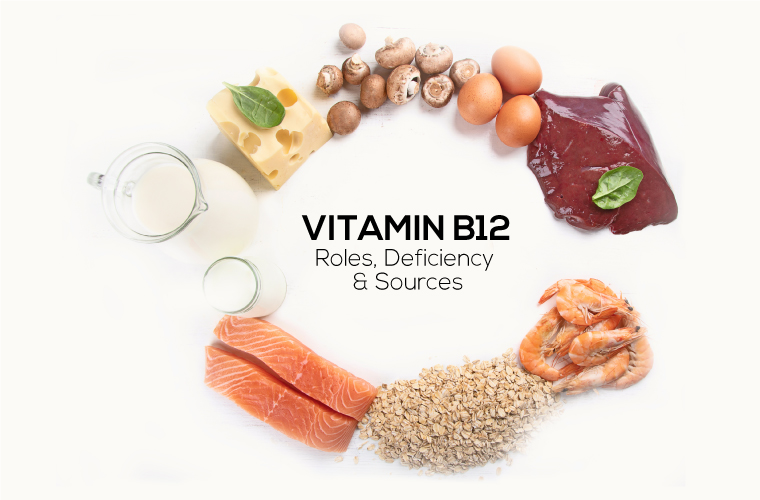Vitamin B12 is a water-soluble vitamin which is also known as cobalamin due to the presence of mineral cobalt in its structure. It plays an essential role in the production of red blood cells (RBCs) and DNA synthesis. It is also important for the proper functioning of the body’s nervous system.
Prevalence of Vitamin B12 deficiency is more than 47% in the Indian population and only 26% of the population is Vitamin B12 sufficient [1]. Dietary Vitamin B12 can be obtained mainly through non-vegetarian diets. The Indian population, with largely vegetarian food habits, is therefore at a higher risk of developing Vitamin B12 deficiency. There are no naturally occurring bioactive forms of Vitamin B12 from plant sources [2], [3].
Functions of Vitamin B12
1. Prevents anemia by inducing RBC formation
Erythropoiesis is the process in which new red blood cells (RBCs) are produced to replace older RBCs. RBCs carry oxygen to the body cells. Cells and tissues utilize oxygen for energy metabolism. Erythroblasts (RBC producing cells) require Vitamin B12 for DNA synthesis which is essential for the multiplication of cells. A lack of Vitamin B12 inhibits erythropoiesis, or production of RBCs, due to impaired DNA synthesis that leads to anemia [4].
2. Prevents cardiovascular disease
Elevated levels of homocysteine (sulfur-containing amino acid) is one of the risk factors for cardiovascular diseases. High homocysteine levels in the blood are believed to promote thrombogenesis (blood clot formation in the blood vessels) and lipid peroxidation (oxidation of lipid). Oxidized lipids deposit in the blood vessels and restrict the blood flow that can lead to cardiovascular diseases. Vitamin B12 is required for the functioning of methionine synthase which metabolizes homocysteine. In the absence of Vitamin B12, homocysteine levels can rise due to the inadequate functioning of methionine synthase [2], [3].
3. Supports bone health
Bones with low mineral density can become weak and fragile over time, leading to an increased risk of osteoporosis. A large clinical study involving 2,576 adults has established a linkage between low Vitamin B12 and low Bone Mineral Density (BMD). Men and Women with low Vitamin B12 levels have been found to have lower than average BMD [5].
4. Beneficial for brain health
Observational studies have shown a positive association between elevated homocysteine levels and dementia. Vitamin B12 deficiency may increase the accumulation of homocysteine in the blood that may affect the cognitive function of the brain. Supplementation of Vitamin B12 can be beneficial in improving the brain function as it can lower the levels of homocysteine in the blood. In addition, Vitamin B12 is found to promote the repair of damaged nerves [6], [7].
Vitamin B12 Deficiency:
Vitamin B12 plays a key role in DNA synthesis. Without Vitamin B12, the instructions for RBC production are incomplete and cells are unable to divide. This leads to undeveloped RBCs and levels of healthy RBCs in the blood declines. Low RBC level affects the oxygen transport in the body, depriving cells and tissues of much needed oxygen for energy metabolism. This can lead to anemia.
A deficiency of Vitamin B12 is also associated with elevated levels of homocysteine levels in the body. Higher levels of homocysteine cause brain cells to die. Death of brain cells is associated with a loss of memory and dementia. High levels of homocysteine are also considered to increase the risk of cardiovascular diseases. Homocysteine can induce fat deposition in the blood vessels (atherogenic potential) and therefore can induce blood clotting in the blood vessels [8], [9].
Signs and symptoms of Vitamin B12 deficiency
Watch out for below signs and symptoms that are indicators of possible Vitamin B12 deficiency
1. Fatigue and weakness
Vitamin B12 deficiency can cause a decline in the levels of healthy RBCs in the body. Lack of healthy RBCs deprives the cells and tissues of oxygen needed for energy metabolism. Therefore, Vitamin B12 deficiency can lead to low energy levels in the body manifesting in the form of weakness and fatigue.
2. Tingling sensation in hands & feet
A lack of Vitamin B12 damages the myelin sheath that surrounds and protects nerves. Without this protection, nerves cease to function properly and conditions such as peripheral neuropathy occur that may cause tingling and numbness in your hands and feet [10].
3. Shortness of Breath
The low levels of Vitamin B12 slow down healthy RBC production. The decline in oxygen transport to the cells due to lack of healthy RBCs can leave you gasping for breath even after light physical activity.
4. Pale Skin
The undeveloped RBCs are unable to pass through into blood circulation. The lack of flow of healthy RBCs in the circulation under the skin can cause the skin to look pale.
5. Mood Disorders
Elevated homocysteine levels can damage the brain cells and interfere with signals to and from the brain. The interference can manifest itself in the form of frequent mood changes and disorders.

How to combat Vitamin B12 deficiency?
ICMR recommends a daily Vitamin of 1 mcg for adult men and women. The requirement of Vitamin B12 goes up to 1.2 mcg for pregnant and 1.5 mcg for lactating women.

Vitamin B12 is found naturally in a wide variety of animal foods. Plant foods have no Vitamin B12 unless they are fortified. If you have been noticing symptoms of Vitamin B12 deficiency, fret not. Following dietary sources can provide ample Vitamin B12 to fufill the daily requirement (values per 100 g serving) [11], [12]:
- Duck Liver – 90.1 mcg
- Chicken Liver – 16.6 mcg
- Swiss Cheese – 3.3 mcg
- Salmon Fish – 3.2 mcg
- Boiled Eggs – 1.1 mcg
- Yogurt – 0.8 mcg
- Milk – 0.5 mcg

In Conclusion …
Vitamin B12 plays critical roles in our body including red blood cell formation, neurological function, and DNA synthesis. A deficiency of Vitamin B12 can cause anemia, dementia, loss of brain function, tingling and numbness of hands and cardiovascular disease. Vitamin B12 is found naturally in a wide variety of animal foods and is not available in plant sources.
The prevalence of Vitamin B12 deficiency is very high (>47%) in the Indian population. Thus, it is important for us to address Vitamin B12 deficiency march towards a deficiency free nation.
#ShareIfYouCare #RepublicofDeficiency
Sources:
[1] Singla R, Garg A, Surana V, Aggarwal S, Gupta G, Singla S. Vitamin B12 deficiency is endemic in Indian population: A perspective from North India. Indian J Endocr Metab [serial online] 2019; 23:211-4
[2] https://www.ncbi.nlm.nih.gov/pmc/articles/PMC3257642/
[3] https://ods.od.nih.gov/factsheets/VitaminB12-HealthProfessional/
[4] https://www.ncbi.nlm.nih.gov/pubmed/15189115
[5] https://www.ncbi.nlm.nih.gov/pubmed/15619681
[6] https://www.ncbi.nlm.nih.gov/pubmed/18089953?dopt=Abstract
[7] https://www.ncbi.nlm.nih.gov/pmc/articles/PMC6491933/
[8] https://ods.od.nih.gov/pdf/factsheets/VitaminB12-Consumer.pdf
[9] https://www.ncbi.nlm.nih.gov/pmc/articles/PMC3376015/
[10] https://www.foundationforpn.org/what-is-peripheral-neuropathy/causes/vitamin-nutrition-deficiency/
[11] https://www.ncbi.nlm.nih.gov/pmc/articles/PMC5788147/
[12] https://fdc.nal.usda.gov/fdc-app.html#/food-details/485281/nutrients













